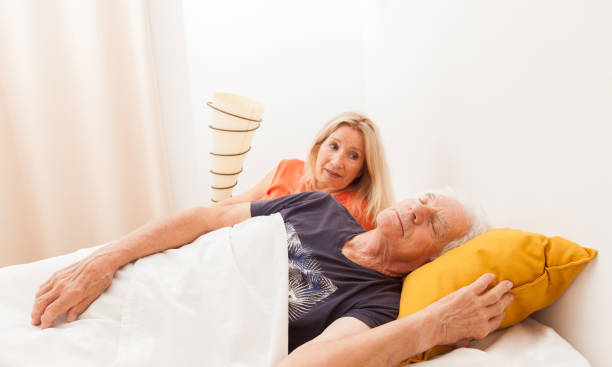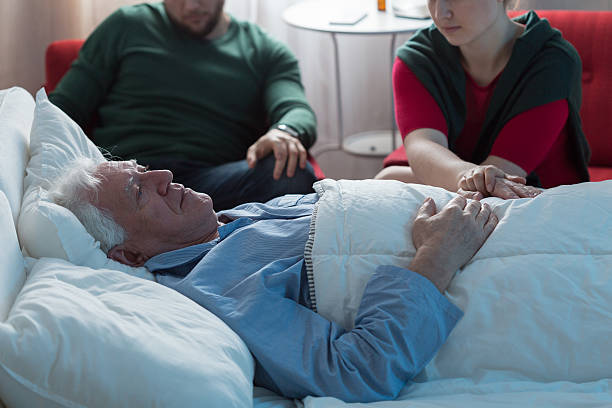Introduction

Are you seeking a comprehensive guide on bedding basics specifically designed for Parkinson's patients? Look no further! Today's blog post is about Bedding Basics: A Starter Guide for Parkinson's Patients. We aim to thoroughly examine various bedding options that can enhance comfort and ease for individuals with Parkinson's Disease. We will discuss selecting the appropriate bedding that meets your requirements and provide recommendations to get the most out of them. Let's begin exploring bedding basics for people with Parkinson's!
Our guide offers information and resources to help you make informed decisions about bedding options for patients with Parkinson's. We aim to provide accurate information and guidance to help you make knowledgeable decisions regarding your health and well-being.
Definition of Parkinson's Disease
The condition called Parkinson's Disease gradually affects both the brain and body. It causes tremors, stiffness, rigidity, slowed motor movement, impaired balance and coordination, and difficulty with speech and other communication issues. The cause of Parkinson's Disease is the reduction of brain cells that generate dopamine. When these cells are lost, the brain can't send signals that control movement, resulting in the symptoms of the disease.
While there is no cure for Parkinson's, treatment and lifestyle changes can enhance one's quality of life and decelerate the disease's advancement. One such modification is ensuring you have a comfortable sleeping environment at night.
Bedding Basics: A Starter Guide

Creating a safe and comfortable sleeping environment is especially important for Parkinson's patients. Due to the physical symptoms associated with this disorder, people may struggle to find comfort while sleeping on regular bedding arrangements. To make sure that you get the restful sleep you need, here are some tips on setting up your bedding for Parkinson's Disease:
1. Choose a supportive mattress that is comfortable enough to prevent restlessness but also soft enough not to cause any joint pain.
2. Invest in good quality pillows designed specifically for people with Parkinson's Disease - these will help support the neck and head to prevent discomfort.
3. Choose a blanket that is lightweight and breathable, so you can keep your body temperature regulated during the night.
4. Use a bed rail or safety net to prevent falls or other accidents while you sleep.
5. Choose sheets and sleepwear designed to make it easier to move in bed. Such items work to minimize friction during repositioning actions and thereby allow greater freedom of movement.
warm.
How a Proper Sleeping Environment Can Help with Symptoms
Creating a sleeping environment that promotes quality sleep is crucial to better-managing symptoms of mental health disorders. A comfortable mattress, a quiet room, and blackout curtains can all help make the bedroom more conducive to good quality sleep. Additionally, being mindful of what one consumes before bedtime is also important. For better sleep quality, it's recommended to avoid having caffeine, alcohol, and nicotine during late evening and nighttime since they may interfere with sleep.
The use of calming bedtime routines can also help in the management of symptoms. Relaxation techniques such as deep breathing exercises, gentle stretching, or guided meditation can all work to reduce stress levels before bedtime. A consistent bedtime routine is beneficial for managing symptoms of mental health disorders as it reduces anxiety and promotes a healthy sleep pattern.
It is essential to establish a supportive atmosphere in the bedroom. Home decorations and items such as plants, soft lighting, and scents can help promote calm and relaxation when going to bed. Creating a more pleasant environment in the bedroom can improve sleep and overall mental health.
Tips for Parkinson's Patients When Shopping for Bedding Basics

1. Start with the mattress: The mattress should be firm and supportive, as this will help reduce muscle fatigue and improve posture while sleeping. Consider a memory foam or latex mattress for better body contouring and pressure relief for those with Parkinson's. However, as the body sinks into these types of surfaces, moving can become more difficult. Compare the ease of moving between various mattress types and take advantage of trial periods to see which type is most comfortable and allows easier moving.
2. Choose the right pillow: Incorrect height can cause neck strain and soreness. Look for a pillow to reduce pressure on your head, neck, and shoulders while providing support. Memory foam pillows are great for providing extra cushioning and contouring to the body.
3. Think about temperature control: If you have difficulty regulating your body temperature at night, look for bedding that wicks away moisture and keeps you cool. Choosing a memory foam mattress is a good option. Natural fibers like wool and cotton are also great choices because they are highly breathable and regulate body temperature effectively. However, frictional resistance to moving is relatively high. Some synthetic fabrics such as polyester can also be breathable and mositure-wicking. The advantage of these textiles is their ultra-smooth fibers which can be used to advantage for minimizing friction on the right type of bed sheet. The combination of such sheets and sleepwear can dramatically improve freedom of movement, comfort and sleep.
4. Be mindful of allergens: Allergens such as dust mites, pet dander, and mold can worsen symptoms for those with Parkinson's. Look for mattress and pillow protectors that guard against these allergens and bedding made from hypoallergenic materials like bamboo or organic cotton.
5. Get the right size: Getting bedding that fits your body properly is important. Measure your mattress to ensure you get the right size sheets and blankets.
By following these tips, Parkinson's patients can find bedding basics that are comfortable, supportive, temperature-controlled, and hypoallergenic. Investing in quality bedding can help improve sleep hygiene and overall well-being for those with Parkinson's Disease.
Types of Mattress and Pillows for Parkinson's Patients When Shopping for Bedding Basics
Here are some types of Mattress and Pillows for Parkinson's Patients:
1. Memory Foam Mattresses: A popular choice for those with Parkinson's is memory foam mattresses, as they provide excellent support and cushioning. The mattresses are made to reduce pressure points and relieve muscle and joint pain that may result from using a regular mattress. However, be sure to experience how easy or difficult it is to move and reposition before committing to this type of mattress. While it provides great support as the body sinks into the memory foam, it can also present a greater challenge to moving on it.
2. Latex Mattresses: Another great option for those with Parkinson's is a latex mattress, as it provides superior support and comfort. Latex mattresses are also designed to help keep the body properly aligned while sleeping, which can help reduce restlessness and discomfort during sleep.
3. Pillow-Top Mattresses: Pillow-top mattresses provide an extra cushioning layer that helps reduce pressure points and support those with Parkinson's. The sleeping aids also ensure the body is aligned correctly during sleep.
4. Adjustable Beds: An adjustable bed is great for anyone with Parkinson's, as it allows you to alter the angle of the bed to your desired level. This can provide relief for the discomfort and pain related to the condition.
5. Specialty Pillows: Specialty pillows are designed to provide therapeutic support for those with Parkinson's, providing greater comfort and helping reduce restlessness during sleep. Choose the pillow shape and size that fits your needs from the available options.
By choosing the right mattress and pillow, Parkinson's patients can get the restful sleep they need to help manage their condition. Finding the perfect bedding basics for a great night's sleep is easy with this guide's help.
What is the special bed for Parkinson's patients?
The special bed for Parkinson's patients is a specially designed sleeping system that can benefit individuals. These beds are typically adjustable and have features like pressure-relieving mattress surfaces, specialized headboards, and additional support components to ensure maximum comfort throughout the night.
Such beds can also help reduce nighttime stiffness or spasms associated with Parkinson's and provide appropriate support for the body to align naturally. Additionally, people with Parkinson's may find getting in and out of bed easier due to its adjustable features. This bed type can be a helpful tool for those with the condition, allowing them to maximize comfort while sleeping.
What helps Parkinson's patients sleep?
Many people with Parkinson's disease experience difficulty sleeping. However, there are some helpful strategies to help improve sleep:
-
Exercise regularly during the day: Regular exercise can help reduce muscle stiffness that may interfere with good sleep. To achieve a better quality of sleep, it is advisable to refrain from exercising before bed because it may stimulate the body and cause difficulty in falling asleep.
-
Avoid caffeine and other stimulants: For a more restful sleep, it's best to avoid having caffeine later in the day as it can disturb your sleeping pattern. Creating a consistent bedtime routine that involves activities like reading a book, taking a warm bath, or listening to soothing music can help improve your sleep.
-
Practicing these habits every night will notify your body that it's time to rest.
-
Keep the bedroom comfortable: The temperature in the bedroom should be cool, and the room should be dark, quiet, and free from distractions. Making sure your bed is comfortable is important for good sleep. If muscle stiffness makes sleeping on your back difficult, try sleeping on your side.
-
Avoid napping during the day: Taking a nap may affect your sleep schedule and make it difficult to fall asleep at bedtime.
FAQ's
How do Parkinson's patients sleep at night?
Many people with Parkinson's disease experience difficulty sleeping. However, there are some helpful strategies to help improve sleep, such as exercising regularly during the day, avoiding caffeine and other stimulants, establishing a consistent bedtime doses routine, keeping the bedroom comfortable, and avoiding napping during the day.
Why can't people with Parkinson's sleep at night?
Some symptoms of Parkinson's Disease, such as muscle stiffness, tremors, and anxiety, can make it difficult to fall or stay asleep. In addition, medications used to treat Parkinson's may also affect sleep patterns.
What is the best position to sleep in for Parkinson's?
If you experience muscle stiffness and have difficulty sleeping on your back, try sleeping on your side instead. This position is generally more comfortable and can also help alleviate stiffness. Additionally, ensure that your bed is comfortable and maintain a distraction-free, dark, and quiet sleeping environment in your bedroom.
Is Parkinson's worse in the morning or night?
For many people with Parkinson, the symptoms can be more noticeable in the morning, when dopamine lower levels. However, it can also vary for individuals; some may worsen their symptoms at night.
What medication is used for Parkinson's fatigue?
The most common medications for Parkinson's fatigue are dopamine agonists and MAO-B inhibitors. Dopamine agonists can help improve energy levels during the day, while MAO-B inhibitors can help reduce daytime sleepiness. Getting enough restful sleep every night is crucial in reducing fatigue. If you experience fatigue, consult with your doctor. They may suggest lifestyle changes or other medications to improve energy levels.
Conclusion
I hope this article has given you valuable insights into bedding fundamentals for individuals with Parkinson's disease. It is important to establish a regular bedtime routine, steer clear of caffeine and stimulants, ensure a comfortable bedroom environment, exercise regularly throughout the day, and refrain from daytime napping to achieve sufficient and restful sleep each night. If you are facing fatigue, it is advisable to consult your doctor, who can recommend alternative medications or lifestyle adjustments.

